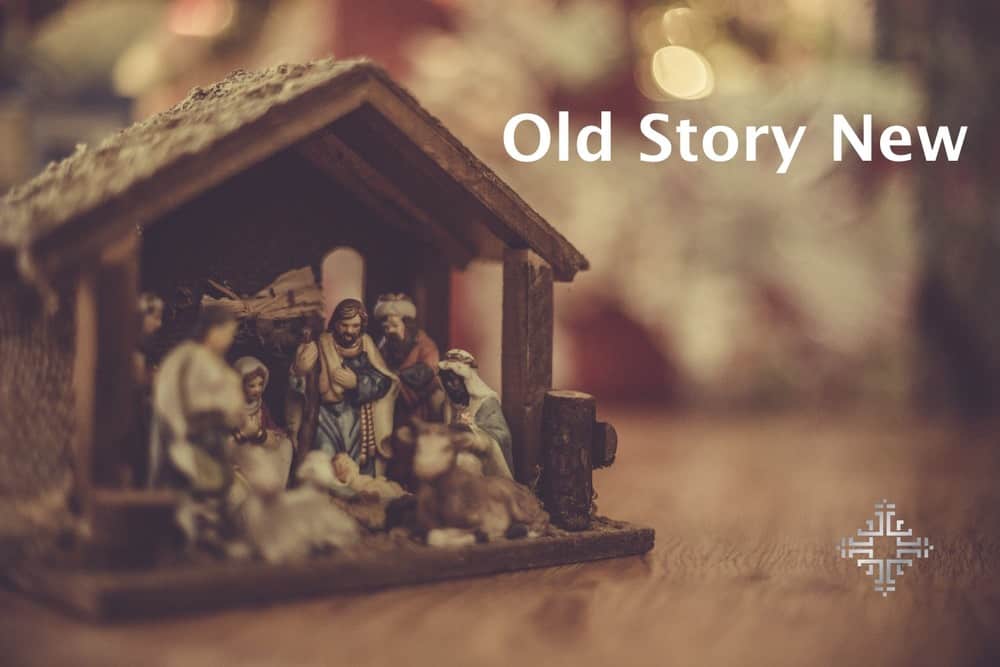The Ordinary, Extraordinary Birth

Big Idea: Jesus’ birth shows that God hasn’t given up on us, and has acted on our behalf.
Two years ago I met someone outside of a café in Liberty Village who told me that we needed to book all the party rooms in all the condos, and tell the story of Christmas. Don’t embellish it, she said. Just stick to the real story, because the community needs to hear it.
The person who told me this isn’t a Christian, but I think she was on to something. We need to hear the Christmas story again. I need to hear it again. As someone has said, familiarity with the Christmas story breeds laziness. Not contempt, but laziness. When we get lazy with the Christmas story, we lose its impact. The beginning of the greatest true story to ever take place becomes dulled.
So let’s look at the story. There’s a relatively small amount of ground to cover. The Bible devotes only four and a half chapters (out of 1,189) to Jesus’s first days. But the story is huge, and it never gets old.
I want to look with you today at one of the early story of Jesus’ birth, and what it means for us today.
As you may know, there are four gospels or biographies of Jesus in the Bible. The one we’re going to look at today is the Gospel of Matthew. It was written by an early follower of Jesus, based on eyewitness accounts, and circulated around 50 or 60 AD, within a few years of Jesus’ life.
It is the most widely used Christian gospel in the first two centuries. When early Christians began to put the Scriptures together, they put Matthew’s account of Jesus’ life first. So it’s an important account for us, and I want to look at what it says about Jesus’ birth.
Here’s the strange thing, at least for us. Matthew begins with the genealogy of Jesus. The first seventeen verses are all about Jesus’ bloodline. The problem? Genealogies typically hold very little interest for most of us, unless you’re into genealogical research. But Matthew, who was a skilled writer, put it first. He knew the value of a strong lead, and so it was no mistake. We have to ask ourselves what we’re missing when we skip over the genealogy to get to the good stuff. But just file it away for a second: the story of Jesus begins with a genealogy.
But then, in verse 18, we meet Mary and Joseph. They’re betrothed. Weddings back then usually took place when the man was about 18, and the woman was in her early teens. Betrothal was a legally binding commitment to get married, that could not be broken except by divorce. Prior to marriage, they lived apart, and were expected to refrain from sexual relations until they were married.
So when Joseph finds out that Mary is pregnant, it’s a serious matter. He knows that he wasn’t the Father, and that Mary could be put to death in that day for sleeping with another man. He decides to keep things quiet, and to divorce her quietly to minimize the impact. But then an angel appears, and tells Joseph that the child was conceived as a direct result of the Holy Spirit. This is a supernatural birth. The baby will be the promised Messiah, the fulfillment of all the promises of Scripture. He will be the very presence of God with man: Immanuel, God With Us.
Joseph does what the angel commands, and took Mary to be his wife, but doesn’t have sexual relations with her until after the birth of Jesus.
So that’s the story. Matthew’s account doesn’t tell us everything. For example, he does not mention the lives of Mary and Joseph in Nazareth, the appearance of the angel to Mary, Mary’s visit to Elizabeth, the census, the trip to Bethlehem, the lack of room in the inn, or the manger. We’ll have to look to other accounts for this. But you have the basic points: Jesus has a genealogy, and Jesus’ birth is supernatural.
At this point you probably have two questions. The first has to do with the plausibility of all of this. Angels? Virgin births? The Messiah? It all seems so implausible. I get it. I talked to a an recently who said that he couldn’t accept the miracles of the Bible because he believes in science. It’s important, though, to understand that this, too, is a belief system. It’s called philosophical naturalism, the view that the material world is all that exists, and that there is no such thing as God or supernatural intervention, and that science explains everything. I don’t think we realize how steeped we are in this view. Many of us were taught this growing up. The problem is, it’s also a view that falls short.
If you have a hard time believing in the existence of angels and miracles, at least consider that it’s because you have a prior commitment to your own belief system. Be willing to look at that belief system as well as Christianity’s. Don’t just assume that your belief system is accurate. Be willing to look at Scripture, which says on every page that there is a God who is involved in this world, who created science, and is not only powerful enough to create everything that we see around us, but can intervene in a supernatural way. That’s one question we have to get out of the way, because Scripture does say that Jesus’ birth was supernatural.
There’s a second question, though, we need to ask. What does all of this mean? We’ve talked about the genealogy, the pregnancy, and the angel’s announcement about Jesus?
Here’s what I think Matthew is telling us. I really want you to hear this. It’s important. Jesus’ birth shows that God hasn’t given up on us, and has acted on our behalf. Let me say that again: Jesus’ birth shows that God hasn’t given up on us, and has acted on our behalf.
The genealogy shows us that Jesus is part of a bigger story, of which we’re a part. It’s a story that shows us that although God could have given up on us, he hasn’t. In fact, the birth of Jesus marks a new beginning.
The miraculous birth shows us God hasn’t just refused to give up, but he’s acted in a way that we never could. He has has taken the initiative and has acted decisively for you.
Let me show you what this means for your life. If you thought the genealogy is boring, you’re going to be surprised that a lot of what I’m going to say comes from the genealogy.
God doesn’t give up. The genealogy reminds us that Jesus is part of a story that began much earlier, a story that includes us. The Bible tells us that our story began with our first ancestors, who rebelled against God. Their rebellion introduced evil into this world, which has infected everything. It’s what’s led to sickness, loss, and death — everything bad that we can imagine. Humanity has become slaves to the evil rule of sin and death, rather than to the good reign of God.
But here’s the good news: “God did not simply walk away from his creation in the midst of turmoil and rebellion but purposed to rescue it at great cost to himself” (Andreas J. Köstenberger and Alexander Stewart). Jesus is the hinge point in the story of God’s reclamation project. Long ago, God promised that he would crush the head of the Serpent, who tempted our ancestors with evil. He then chose a family, which is where the genealogy starts. And then within the family, he chose a tribe. And then, generations later, he chose the bloodline of King David. You read the rest of the Hebrew Scriptures, and you wonder: will God keep his promise? The people keep getting worse and worse. The promises don’t seem to be getting any closer to fulfillment. Entire centuries go by without anything seemingly happening. When the Old Testament ends, the promised offspring hasn’t come. God’s people are in exile. David’s kingdom has been defeated. The world has not been set right.
And then comes Matthew 1:1: “The book of the genealogy of Jesus Christ, the son of David, the son of Abraham.”
Finally, our reader finds resolution to the tension introduced in Genesis. Jesus is the promised seed who will set everything right! The entire Old Testament progressively narrows down the identity of God’s Messiah until the day he finally arrives— the day God comes to his creation to undo the work of the fall, destroy the works of the Devil, and begin to set things right. (Köstenberger and Stewart)
In fact, the first two Greek words of Matthew — we translate them “the book of the genealogy” — echo the first words of the Bible that introduce creation. It means that God is hitting the reset button, and giving us a new start in Jesus Christ. He’s making all things new.
God is incredibly patient. He doesn’t give up. He puts up with an awful lot. He does this for a long time. But count on it: God keeps his promises. You’re included. There’s no disappointment, no setback that can stand in the way of his purposes for your life. God just doesn’t give up.
God doesn’t write us off. I love the people listed in this genealogy. You have great people, but even the great people weren’t all that great. Abraham pimped out his wife. David committed adultery and committed murder. And those are the good guys. You also have four women listed in the genealogy, which would have been very unusual back then. All four women were outsiders to Israel with questionable backgrounds.
- Tamar was a Canaanite who disguised herself as a prostitute in order to seduce Judah.
- Rahab was a Canaanite prostitute who lied to protect the Israelite spies and helped overthrow Jericho.
- Ruth was a Moabite woman who moved to Israel upon the death of her husband.
- Bathsheba was the wife of Uriah the Hittite; King David married Bathsheba after fathering a child by her and killing her husband.
Matthew is showing us that God is gracious. He doesn’t write us off, despite our sordid stories and questionable pasts. God actively seeks to restore sinners and include us in his story. There’s nothing that you have done that excludes you from the grace of God. God doesn’t write us off, no matter what he’s done.
God is sovereign even when he seems absent. Matthew divides the genealogies into three periods of fourteen generations: Abraham to David, David to the exile, and the exile to Jesus. Matthew is showing that God was in control of history, even through the most difficult periods of Israel’s history. God is in control, even of the difficult parts of our stories. He’s sovereign and active even when he seems absent.
God has done what we couldn’t do for ourselves. You may be asking yourself why the virgin birth was so important. John Frame gives five reasons:
The virgin birth is doctrinally important because of: (1) The doctrine of Scripture. If Scripture errs here, then why should we trust its claims about other supernatural events, such as the resurrection? (2) The deity of Christ. While we cannot say dogmatically that God could enter the world only through a virgin birth, surely the incarnation is a supernatural event if it is anything. To eliminate the supernatural from this event is inevitably to compromise the divine dimension of it. (3) The humanity of Christ. This was the important thing to Ignatius and the second century fathers. Jesus was really born; he really became one of us. (4) The sinlessness of Christ. If he were born of two human parents, it is very difficult to conceive how he could have been exempted from the guilt of Adam’s sin and become a new head to the human race. And it would seem only an arbitrary act of God that Jesus could be born without a sinful nature. Yet Jesus’ sinlessness as the new head of the human race and as the atoning lamb of God is absolutely vital to our salvation (Rom. 5: 18– 19; 2 Cor. 5: 21; Heb. 4: 15; 7: 26; 1 Pet. 2: 22– 24). (5) The nature of grace. The birth of Christ, in which the initiative and power are all of God, is an apt picture of God’s saving grace in general of which it is a part. It teaches us that salvation is by God’s act, not our human effort.
I want to focus on the last reason. The virgin birth of Jesus reminds us that salvation is of the Lord. It’s all his doing, and it’s not by human effort. It’s all of God’s grace. God has acted in history and has done what we couldn’t do for ourselves.
Two years ago, my friend told me that we need to hear the real Christmas story. She was right. Here’s what I needed to hear today. Jesus’ birth shows that God hasn’t given up on us, and has acted on our behalf.
So here’s what I want to invite you to do. Bring yourself to Jesus, who has never given up on you. Your story is not too messy for him. He has acted in history to send his Son for people like us. The real story of Christmas is about a God who just won’t give up on us, and who has intervened in history to give us His Son to save us. Let’s come to him today.





